Top Rankings
Grand School District ranks among the top 20% of public school district in Utah for:
Category
Attribute
Student Attention
Lowest student:teacher ratio (Top 1%)
For the 2025 school year, there are 4 public schools serving 1,451 students in Grand School District. This district's average testing ranking is 3/10, which is in the bottom 50% of public schools in Utah.
Public Schools in Grand School District have an average math proficiency score of 27% (versus the Utah public school average of 39%), and reading proficiency score of 31% (versus the 43% statewide average).
Minority enrollment is 33% of the student body (majority Hispanic), which is more than the Utah public school average of 29% (majority Hispanic).
Overview
This School District
This State (UT)
# Schools
4 Schools
1,112 Schools
# Students
1,451 Students
681,035 Students
# Teachers
85 Teachers
31,284 Teachers
Student : Teacher Ratio
17:1
17:1
District Rank
Grand School District, which is ranked within the bottom 50% of all 153 school districts in Utah (based off of combined math and reading proficiency testing data) for the 2020-2021 school year.
The school district's graduation rate of 70-74% has decreased from 90-94% over five school years.
Overall District Rank
#113 out of 154 school districts
(Bottom 50%)
(Bottom 50%)
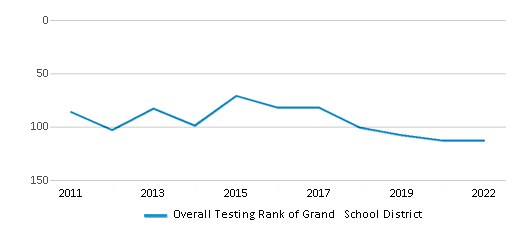
Math Test Scores (% Proficient)
(20-21)27%
39%
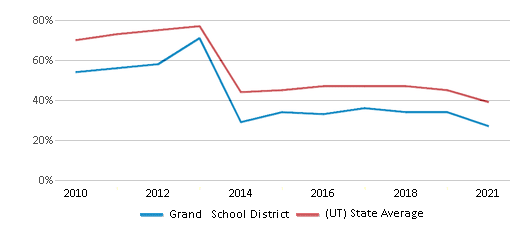
Reading/Language Arts Test Scores (% Proficient)
(20-21)31%
43%
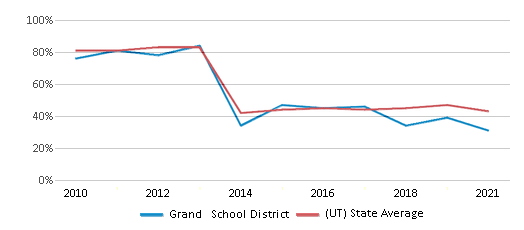
Science Test Scores (% Proficient)
(20-21)36%
45%
Graduation Rate
70-74%
88%
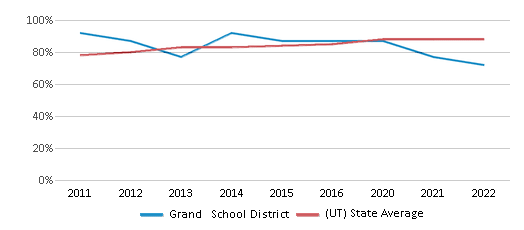
Students by Ethnicity:
Diversity Score
0.49
0.46
# American Indian Students
88 Students
6,356 Students
% American Indian Students
6%
1%
# Asian Students
6 Students
11,203 Students
% Asian Students
1%
2%
# Hispanic Students
340 Students
135,730 Students
% Hispanic Students
24%
20%
# Black Students
4 Students
8,999 Students
% Black Students
n/a
1%
# White Students
976 Students
481,682 Students
% White Students
67%
71%
# Hawaiian Students
3 Students
10,774 Students
% Hawaiian Students
n/a
1%
# Two or more races Students
33 Students
26,165 Students
% of Two or more races Students
2%
4%
Students by Grade:
# Students in PK Grade:
54
16,573
# Students in K Grade:
88
44,583
# Students in 1st Grade:
93
47,327
# Students in 2nd Grade:
110
50,032
# Students in 3rd Grade:
93
50,137
# Students in 4th Grade:
98
50,477
# Students in 5th Grade:
110
51,752
# Students in 6th Grade:
107
50,580
# Students in 7th Grade:
129
52,075
# Students in 8th Grade:
116
52,556
# Students in 9th Grade:
129
53,806
# Students in 10th Grade:
117
55,206
# Students in 11th Grade:
109
54,321
# Students in 12th Grade:
98
51,610
# Ungraded Students:
-
-
District Revenue and Spending
The revenue/student of $18,456 is higher than the state median of $10,732. The school district revenue/student has stayed relatively flat over four school years.
The school district's spending/student of $26,891 is higher than the state median of $10,829. The school district spending/student has stayed relatively flat over four school years.
Total Revenue
$27 MM
$7,309 MM
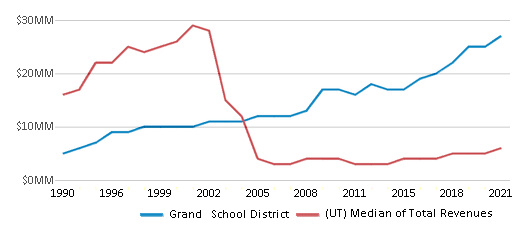
Spending
$39 MM
$7,375 MM
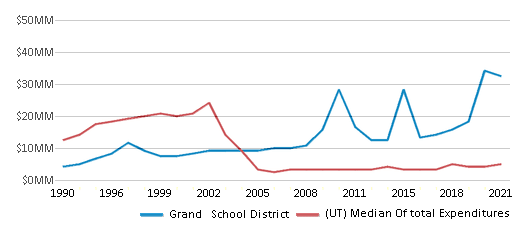
Revenue / Student
$18,456
$10,732
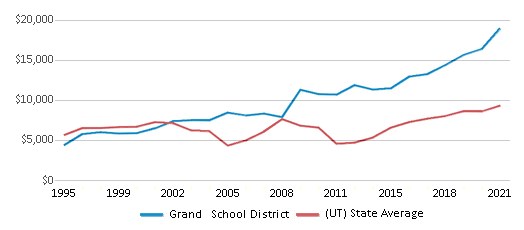
Spending / Student
$26,891
$10,829
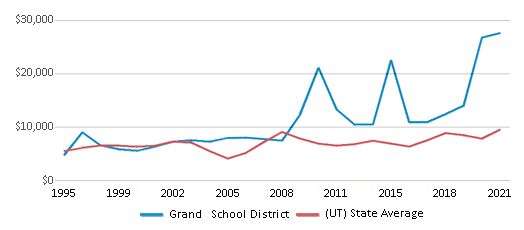
Best Grand School District Public Schools (2025)
School
(Math and Reading Proficiency)
(Math and Reading Proficiency)
Location
Grades
Students
Rank: #11.
Grand County High School
(Math: 20-24% | Reading: 45-49%)
Rank:
Rank:
4/
Bottom 50%10
608 S 400 E
Moab, UT 84532
(435) 259-8931
Moab, UT 84532
(435) 259-8931
Grades: 9-12
| 453 students
Rank: #22.
Helen M. Knight School
(Math: 30% | Reading: 28%)
Rank:
Rank:
3/
Bottom 50%10
505 N Mivida Dr
Moab, UT 84532
(435) 259-7350
Moab, UT 84532
(435) 259-7350
Grades: K-6
| 699 students
Rank: #33.
Grand County Middle School
(Math: 24% | Reading: 31%)
Rank:
Rank:
3/
Bottom 50%10
439 S 100 E
Moab, UT 84532
(435) 259-7158
Moab, UT 84532
(435) 259-7158
Grades: 7-8
| 245 students
Rank: n/an/a
C R Sundwall Center
Special Education School
190 E 100 N
Moab, UT 84532
(435) 259-5628
Moab, UT 84532
(435) 259-5628
Grades: PK
| 54 students
Frequently Asked Questions
How many schools belong to Grand School District?
Grand School District manages 4 public schools serving 1,451 students.
What is the rank of Grand School District?
Grand School District is ranked #110 out of 153 school districts in Utah (bottom 50%) based off of combined math and reading proficiency testing data for the 2020-2021 school year. This district ranks in the top 20% of Utah school districts for: Lowest student:teacher ratio (Top 1%)
What is the racial composition of students in Grand School District?
67% of Grand School District students are White, 24% of students are Hispanic, 6% of students are American Indian, 2% of students are Two or more races, and 1% of students are Asian.
What is the student/teacher ratio of Grand School District?
Grand School District has a student/teacher ratio of 17:1, which is lower than the Utah state average of 22:1.
What is Grand School District's spending/student ratio?
The school district's spending/student of $26,891 is higher than the state median of $10,829. The school district spending/student has stayed relatively flat over four school years.
Recent Articles

Year-Round Or Traditional Schedule?
Which is more appropriate for your child? A year-round attendance schedule or traditional schedule? We look at the pros and cons.

Why You Should Encourage Your Child to Join a Sports Team
Participating in team sports has a great many benefits for children, there is no doubt. In this article you will learn what those benefits are.

White Students are Now the Minority in U.S. Public Schools
Increasing birth rates among immigrant families from Asia and Central and South America, combined with lower birth rates among white families, means that for the first time in history, public school students in the United States are majority-minority. This shift in demographics poses difficulties for schools as they work to accommodate children of varying language abilities and socio-economic backgrounds.





